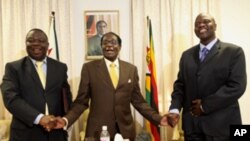This weekend marks the third anniversary of the formation of Zimbabwe’s unity government, which came into being after the internationally-discredited 2008 presidential election. While little political progress has been made since its inception, the unity government has brought some stability to Zimbabwe.
One major improvement in the past three years has been the end of hyper-inflation following the adoption of the U.S. dollar and South African rand - giving Zimbabweans certainty in their day-to-day purchasing power.
Finance Minister Tendai Biti has taken control of revenue collection and of the country’s financial management, which has brought some stability to the economy.
He, together with his fellow Movement for Democratic Change ministers in education and health, and with aid from European countries channeled through the U.N. in Harare, have got most children back to school and most clinics and hospitals operating.
But President Robert Mugabe and his ZANU-PF party continue their control over the security agencies and other key ministries such as home affairs and information. The MDC has accused ZANU-PF of exploiting this control to harass and arrest MDC leaders, and prevent the party from holding rallies.
The MDC and its leader, Prime Minister Morgan Tsvangirai, complain that Mr. Mugabe is also blocking implementation of key clauses in the Global Political Agreement that brought about the unity government.
A new electoral law, the establishment of a human rights commission, and a new constitution endorsed by a referendum are all at least two years overdue.
This week the parliamentary committee overseeing the writing of the new constitution promised it would be ready soon. But, co-chairman Edward Mkhosi was unwilling to confirm press reports that the draft would include age and term limits for presidents.
"No suggested position in the first proposal can be taken as final," he said. "It is therefore premature at this stage to conclude that Zimbabweans through the outreach consultation stated that people who have served at least two terms, or those above the age of 70, will not be able to contest the presidential election."
Age and term limits, if included, would affect President Mugabe, who has ruled Zimbabwe since independence in 1980, and celebrates his 88th birthday later this month.
While Mr. Mugabe wants elections this year, this is unlikely to happen. South African President Jacob Zuma, the Southern Africa Development Community facilitator on Zimbabwe, insists that the new constitution be in place and all requirements of the political agreement met, before elections can take place.
Zimbabwe Marks Third Anniversary of Unity Government




